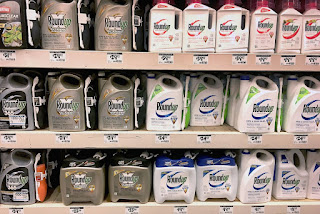 |
| Roundup on store shelves (Scott Olson/Getty Images) |
Citing legal analysts and interviews with lawyers representing the plaintiffs, Thomas reports that the company's recent success "is a result of focusing on the scientific question of whether Roundup causes cancer, and providing more robust data to juries. . . . The company has also been more aggressive in attacking plaintiffs’ arguments on their individual use of the product." Majed Nachawati, a Dallas-based lawyer representing nearly 5,000 claimants, told Thomas that after multiple trials, Bayer's legal team has been better able to roll out a line of experts who have seemed "more appealing" to juries than prior experts.
The company has resolved around 108,000 of the 141,000 claims relating to Roundup, and the courtroom wins will give it more leverage when negotiating settlements.
The wins come on the heels of the Environmental Protection Agency's withdrawal of its interim approval of the herbicide. It can still be used at least through 2026. In 2020, EPA issued an interim decision that found the chemical likely didn't cause cancer, but a federal judge ruled in June that the EPA reached that conclusion without enough facts and ordered the agency to redo its assessment.
The wins come on the heels of the Environmental Protection Agency's withdrawal of its interim approval of the herbicide. It can still be used at least through 2026. In 2020, EPA issued an interim decision that found the chemical likely didn't cause cancer, but a federal judge ruled in June that the EPA reached that conclusion without enough facts and ordered the agency to redo its assessment.
No comments:
Post a Comment